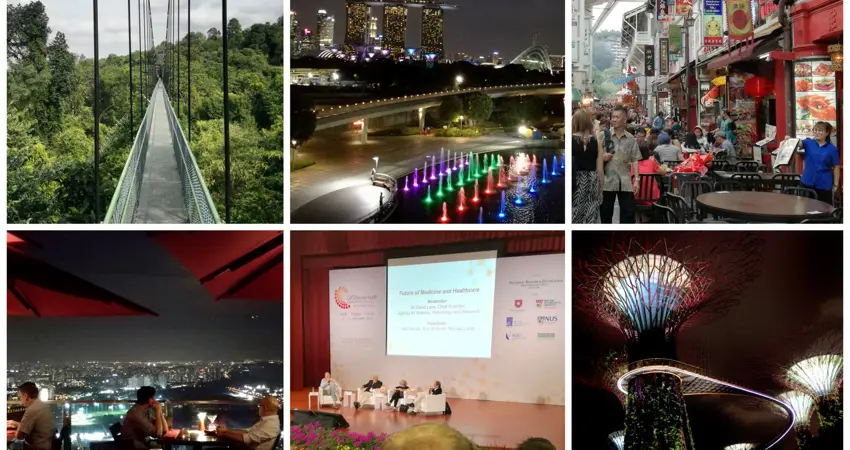01 Feb 2019
Young engineer nominated to attend global summit in Singapore
DPhil student Laura Diment (Brasenose College) recently returned from the 2019 Global Young Scientists Summit in Singapore (20-25 January).

Having graduated from Flinders University, South Australia, in 2012, Laura is continuing her studies as a DPhil student at Oxford. She is based at the Institute of Biomedical Engineering (IBME) where her research interests include the manufacture of customised prosthetics and the human thermoregulatory system.
The summit is a chance for young researchers (aged 35 and under) to interact with eminent scientists and technology leaders, including Nobel Laureates Claude Cohen-Tannoudji (who developed a method of isolating and ‘trapping’ atoms for study) and Aaron Ciechanover (discoverer of the protein ubiquitin).
The University of Oxford was invited to nominate five participants for the five-day programme, and Laura was selected to represent Engineering Science. She tells us more about her experiences at the Summit:
“As a final-year Engineering doctoral student, I was fortunate to be selected to attend the Global Young Scientists Summit (GYSS), celebrating past scientific breakthroughs and exploring the future of science.
“Singapore is an appropriate setting for such a gathering, with its mix of futuristic, high-tech architecture and traditional marketplaces, artificial trees and natural rainforests. Here, I had the opportunity to hear science Nobel Laureates and Fields Medallists present a lay summary of their research. We had 16 plenary lectures from distinguished speakers across a broad range of sciences, panel discussions on key global issues, and small-group sessions where we could interact with our favourite speakers.
“A highlight for me was hearing from Barry Barish, who showed video footage of two black holes merging and described the process of observing gravitational waves. I also enjoyed hearing Michael Graetzel explain his discovery of a new type of solar cell based on dye sensitised nanocrystalline oxide films, which mimic the light reaction occurring during natural photosynthesis. These lightweight, flexible cells have 23% efficiency, much greater than silicon solar cells, and can power portable devices and be used to produce glass windows that generate electricity. Ben Feringa’s work on developing molecular motors and Ada Yonath’s on modelling the effect of antibiotics on ribosomes were also highlights.
“Having the opportunity to engage with over 200 doctoral and postdoctoral students from around the world from disciplines of engineering, chemistry, physics, medicine, mathematics, and computer science – and to discover how science is being shaped and how our knowledge of the world around us is expanding – was exciting.
“Singapore’s dining experience also lived up to its reputation, with Michelin-rated street vendors and bars on top of skyscrapers that gave glorious views of the nightly light shows. I now return from Singapore’s Futuristic Skyline to the Dreaming Spires of Oxford, inspired to dream up new scientific solutions to global issues. I thank the University of Oxford’s Department of Engineering Science and GYSS for offering me this fantastic experience.”
Laura’s DPhil focuses on the manufacture of prosthetics; our limited data means that these sockets can cause discomfort to their users, particularly in hot, humid climates. Her research aims to increase knowledge of the effect of amputation and wearing a prosthesis on the body’s heat transfer, thermoregulation and thermal discomfort. Laura’s investigation made use of amputee questionnaires, an anatomically-accurate bioheat model and an exploratory study of different prosthetic materials.
This research demonstrates that thermal issues within a prosthetic socket are frequent, but the thermal responses of individuals are highly varied and complex. Her bioheat model increases knowledge of the disruption an amputation and a prosthetic socket can have on the thermoregulatory system, and is a step towards providing the information we need to optimise prosthetic sockets for thermal comfort.
Find out more about Laura’s research in the IBME’s Regenerative Medicine Group.




